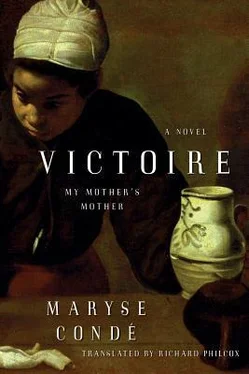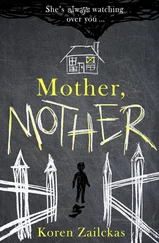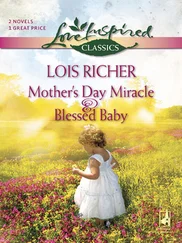“Poor Madame Quidal! You do feel sorry for her!” commented the diners back home with a full stomach, having eaten their fill.
“What can you expect with a daughter like that. She’s a real pain!”
We would be wrong in thinking that Jeanne, like Anne-Marie at the time, got any pleasure out of these weekly gatherings. For her too, but for different reasons, they were torture. It was not just the smell from the mounds of food that turned her stomach together with the sight of the so-called distinguished guests stuffing themselves greedily, Auguste worst of all. What an appetite he had! It was because she was the youngest of the group. They treated her like a child who meddles with grown-up affairs instead of minding her own business. She suggested for instance that the future employees of the Caisse Coopérative des Prêts wear badges with their names on them. A ridiculous idea! Some of them had known the first Madame Boucolon, Antoinette Sambalas, and hinted that she was far better than the second. Less beautiful. Less elegant. Less educated, that’s for sure — she was merely a salesgirl in the haberdashery department of the store Au Dernier Chic — but that didn’t mean she wasn’t less adorable, less agreeable, and she knew where a woman’s place was.
As you can see, life on the rue de Condé was not exactly pleasant. Auguste, who in his time had been quite a lad, had turned over a new leaf. After school was over, he was always home reading his newspaper or watching the crowd in the street from the balcony. In private he did not bother Jeanne with his stories, since she took no interest in them. The one exception to his staid ways was his Montecristo cigars he ordered from Cuba, on which he had his initials, AB, printed on the ring. As for Jeanne, she never stopped working. She would buy the teacher’s answer books and immerse herself into the key to exercises. As for Victoire, she dreamed. About what?
As you can see, there was no music or reading. My father ordered books, a little like he ordered champagne, from the House of Nelson, who shipped the entire works of an author. All of La Fontaine. All of Molière. All of Lamartine. These were hardbacks with a white cover. Once he had arranged them on the library shelves he never touched them again. I can recall having read at the age of ten all the plays of Victor Hugo. Le roi s’amuse made a deep impression on me.
AT THIS TIME, apart from Anne-Marie, Victoire began to keep company with a person who could have been of great comfort to her. Alas, the relationship was short-lived.
Her name was Jeanne Repentir, and she was somewhat of an eccentric. She had arrived from New Orleans five years earlier and had opened a dressmaker’s shop under the name of the Golden Thimble, a modest sign hung on the door of a modest lodging. Jeanne Repentir quickly became the darling of the black and mulatto coquettes of La Pointe, since with the help of a little dark girl from the outlying districts, two mannequins, and a few patterns from the Modes et Travaux collection, she managed to give an inimitable touch to her creations.
Victoire had accompanied her daughter one day for a fitting and the two women had got along well with each other.
They had a good many things in common.
Both from Marie-Galante, they had left their native island very young and had never returned. They had no idea what white man had fathered them, though Jeanne Repentir liked to claim, with no grounds whatsoever, that he was a Basque country gentleman with a double-barreled name as long as your arm. But what would a Basque country gentleman with a double-barreled name as long as your arm be doing in Marie-Galante at the end of the nineteenth century? In any case, I could find no trace of him in the archives. They were so light-skinned that even the eye of a Guadeloupean, expert in detecting the slightest degree of color, could be mistaken. Jeanne Repentir had bluish purple eyes; Victoire’s, as we know, were pale gray.
In an almost identical manner, they had both got pregnant by a black male. As for Gratien Philogène, Jeanne Repentir’s short-lived partner, he had recognized his daughter. However, he had taken so little care of her that he had let her die of tuberculosis at the age of thirteen, whereas he could have had her treated in a sanatorium in France. After that Jeanne Repentir had fallen madly in love with Gervais de Puyrode, a white Creole from Martinique, owner at the time of the Courcelles sugar factory in Sainte-Anne. Barely escaping the fire that burned down his property, Gervais, together with Jeanne and Vitalis, his newborn son, took refuge on the White Mango estate not far from New Orleans. Passion doesn’t last, it’s a well-known fact. Cradling Vitalis in her arms, Jeanne Repentir was soon back in Guadeloupe, where, taking advantage of her travel experiences, she set up her own business. As for Vitalis, he was so handsome, blond and curly-haired, that the priests would choose him every year to crown the Virgin Mary during the August 15 celebrations at the cathedral of Saint-Pierre and Saint-Paul. Apart from that, he was a little brat who broke his mother’s heart by playing hooky and spending his time fighting the little ragamuffins in the Vatable Canal district. Jeanne Repentir lived in expectation of a letter from Gervais, who would bring her back to White Mango, where she and her son would take up their rightful place. She had seen this moment in her dreams and her dreams never lied.
Other things separated them. One of them was fundamental.
Since her mother’s family had not lacked presence of mind, Jeanne Repentir had been educated and knew how to read and write. Her invoices, written in blue ink on squared mauve stationery (my mother kept several of them), were proof of it. She spoke the most refined French, at times a little affected. The two women so alike yet so different would often meet in the afternoons in Jeanne Repentir’s home, composed of four rooms, since the living room was divided in two by a cretonne drape behind which the fittings took place. Victoire sat head lowered over the hems that Jeanne Repentir gave her to overcast, listening intently to her friend’s phantasmagorical tales.
“New Orleans,” she recounted, turning nonchalantly the handle of her Singer sewing machine, “believe me, I never liked that city. It’s built on the stench of the swamps. As soon as dusk falls, there’s a terrible smell and humidity oozes out of everywhere. You can’t even bury the dead for fear the bodies will emerge from the mud and come back to haunt the living.
“I left because of the yellow fever epidemic that broke out that year. I had never seen anything like it. They would cover the heaps of corpses with quicklime and burn them on the sidewalks, in the storm channels and in the yards. What with the stench of the swamps, you can imagine what it was like. Of course there are some things I miss. In the French market, they used to sell bananas as red as pomegranates, grapes as sticky as dates, china, porcelain, and picanninies tattooed like monkeys.”
Having nothing as juicy to recount, Victoire brought desserts that she knew Jeanne Repentir was particularly fond of.
“I’ve got a sweet tooth!” she laughed, showing off her English.
A mamee apple pound cake. A soufflé of ripe papaya. A custard flan with cashew fruit from La Désirade.
“You’re a poet, a poet,” Jeanne Repentir would say, biting greedily into these small wonders. “You don’t know it, but you’re so much better than your daughter.”
She too didn’t like Jeanne very much, although she was one of her best customers. Not that she took offense because Jeanne was jealous of her friendship with Victoire. That’s how children are. But she knew that despite her white skin and her sojourn in the United States, Jeanne looked down upon her. A dressmaker! A subaltern!
Читать дальше












